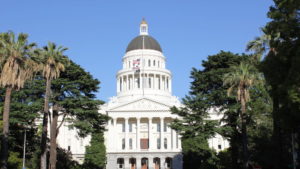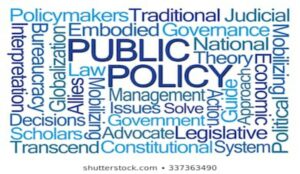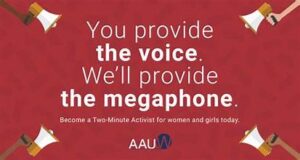AAUW SACRAMENTO PRIORITIES By Kathy Papst
Hello fellow members and board of directors! I am finally back from my self-imposed hiatus in order to get settled into my new home. I am now ready to continue with my efforts to share news and encourage action for our mission of equity for women and girls.
As we start our new calendar year and finish our branch year, I have been reflecting on ways to encourage our members to become involved with our mission. Several articles have been published and emails sent in order for you to share your ideas and possibly take on a board position or chairmanship in our branch. The current board members have been working hard for many years, and some of them are in need of a break. We feel that it is always good to have new perspectives and fresh ideas in these positions. I know that it is daunting, especially if you are new to AAUW and don’t know how the board works for its members. President Nancy McCabe and program co-directors Barbara Smith and Hedda Smithson have told the members that the work involved is easy, and they are correct because we all work together to make it happen, to keep up interest in attending events and becoming involved in opportunities to help our community. It just takes a small leap of faith to step forward.
I would like to invite anyone interested in helping with Public Policy, Civil Rights Advocacy, and Title IX to come to my apartment for lunch and a complete overview of what these positions involve. I would love to have two or three members to help with these programs. I can answer any questions and show you the ropes on how I work for these important mission actions. I have tentatively set this for Thursday, March 20, at 11a.m. If you are curious about the workings of collaborating with me, please email me; my contact information can be found in the Membership Directory.
While I was away for December 2024 and January/February of 2025, the California AAUW board members were working hard with plans for the rest of the fiscal year and beyond. You can find the latest Public Policy Newsletter <here>. Here are a few highlights for these programs.
- The annual Lobby Days are coming up very soon. There was an article in last month’s newsletter and also in the state newsletter, California Connection, explaining how we reach out to California legislators with our support and our mission. The dates are April 8 and 9. On April 8, members of several branches will meet with legislators in person. Activities on April 9 will be on Zoom. The deadline to participate is Feb. 21.
- There were two webinars in January on important topics that we had programs on last year. One was entitled 2024 Revisions to Title IX: How they Impact AAUW Values and Public Policy Priorities. The second webinar was on Reproductive Rights: Where Do We Go from Here? Both webinars are available to watch in the archived programs on the California website.
- The state board has announced that they are having a contest for Branch Activity of the Year. The winning entry will be a branch activity that is novel, inspirational, and mission-related with a DEI component. The activity must be reproducible (AKA “borrowable”) by other branches. Honored branches will receive a small monetary award and bragging rights at the AAUW California Annual Event on April 26. The application on their website and the deadline this year is March 15. I don’t think that the activity has to be completed by the application deadline date, so we can still apply for our remaining programs in March and April.
- The branch leaders were recently sent the Annual Branch Survey regarding the programs and activities that were mission related. The “FIVE STAR PROGRAM” celebrates branches for achieving five stars for commitment to be involved in all aspects of AAUW’s mission. Our branch received three stars. I truly believe that we would have received five stars if we had thought to videotape our tremendous programs throughout the year. All were definitely mission related and well attended. We will have to think about this for the future so that we can shine a light on the hard work we do in this community to foster equity for women and girls.
I highly encourage our members to read the California Connection on the AAUW website. You can find the latest edition <here>. It has so much to offer. It highlights the public policy legislation that AAUW supports. There are articles on ways to highlight branch involvement in AAUW activities. If you have any questions on what they do for branches and members in the state, they will gladly help you out. Our members receive emails with the newsletter each month. If you are not receiving them, you can reach out and request to be added to the roster.
And finally, don’t forget about the TWO MINUTE ACTIVIST on both the national and AAUW California websites. It really works to have individual members tell our legislators that these issues are very important to us.
Thank you. I hope to see you in March for the Civil Rights For All program. Don’t forget to sign up soon.






